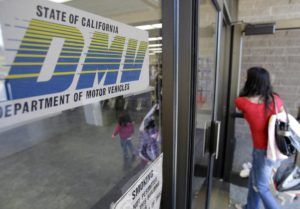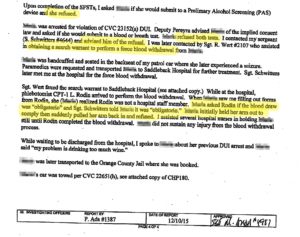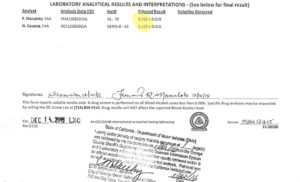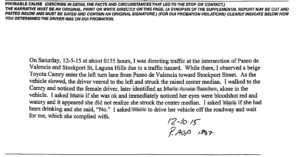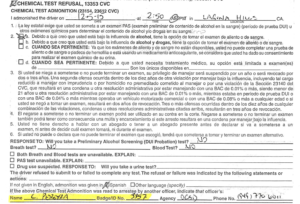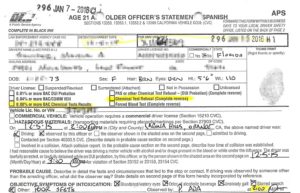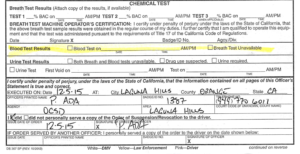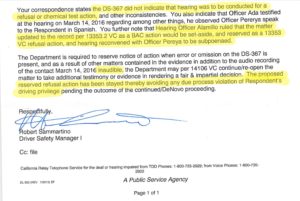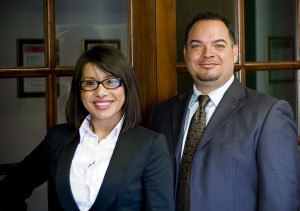Case Study: Winning a second DUI with refusal DMV hearing
Case Study: Winning a second DUI with refusal DMV hearing
This Case Study is another in a series of our firm’s case studies. In this case study: winning a second DUI with refusal DMV hearing, we attempt to show in detail how a prepared Orange County DUI Attorney can use their education, expertise, and experience to obtain a win for a client. In this case, winning a client’s DMV hearing, and thus their driving privileges back, even with very bad facts. After much work, we ended up winning the hearing, which involved all of the following:
- A second time DUI (a DUI with a prior within 10 years)
- An accident/collision, witnessed by the police directly;
- A refusal of a blood or breath test; and
- A high blood alcohol level (an alcohol level of .22%/23%, nearly triple the legal limit).
Note that we have redacted the name and other identifying information of our client in this case study.
Listening to the Client’s Story:
The client came into our office, like most of our clients, as a personal referral from another client that we had helped. She told us the story about how she was following someone home after a Christmas party, and at an intersection in Laguna Niguel, signal lights were out, and an officer was directing traffic and saw her car hit a curb. He walked over to her, smelled alcohol, and started a DUI investigation.
The DMV Discovery
We requested and obtained the police report and blood test results, which revealed the facts involved in the case.
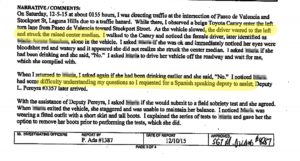 Exhibit 1: The DUI Investigation Police Report showing the facts of the initial contact. (Click on an image to make any image on this page larger and more readable)
Exhibit 1: The DUI Investigation Police Report showing the facts of the initial contact. (Click on an image to make any image on this page larger and more readable)
As you can see in the highlighted section, the officer indicated:
“The driver veered to the left and struck the raised center median.” The officer indicated that he observed bloodshot and watery eyes, and the driver did not admit to drinking.
Because the officer did not speak Spanish, he had difficulty communicating with our client, and requested “for a Spanish-speaking deputy to assist.”
Exhibit 2: A portion of the police report showing the refusal of the breath test, and blood test, the search warrant, and the forced blood draw. (Click on an image to make any image on this page larger and more readable).
The police report, prepared by the same initial officer, indicated that after conducting field sobriety tests, the officer asked the driver, our client, to submit to a breathalyzer test using a Preliminary Alcohol Screening Device (PAS) breath machine. She refused.
The police officer called for and was granted, a search warrant for the client’s blood by a local Orange County judge.
At Saddleback Hospital, the report indicated that after obtaining the search warrant, our client asked if the blood draw was “obligatorio” (obligatory) and was told it was. She then “suddenly pulled her arm back and refused”, according to the report. The police indicated that several people held our client down until the blood was drawn.
The police also indicated that the officer that prepared the report asked our client “about her previous DUI arrest”, which was within 10 years of the date of the report. This made this arrest her second DUI, and with the collision, and the alleged refusal, the facts were not looking good.
The DUI Blood Test
Shortly after the blood was drawn, the Orange County Crime Lab performed a blood test, and the results, although in small print on the exhibit below, show the blood alcohol results,.
The blood test results showed a result of a 0.22% blood alcohol content (BAC) from one test of the blood, and a 0.23% BAC test result from the second test of the same blood. That did not affect the DMV hearing, as the DMV was going to treat this as a refusal case anyway (in which case the blood test results could be declared irrelevant by the DMV hearing officer), but it would have made the client eligible for a high blood alcohol sentencing enhancement on the second time DUI in court.
Exhibit 3: A portion of the blood test results, showing the results after two tests. (Click on an image to make any image on this page larger and more readable).
Because the test was taken within three hours of driving, in accordance with California law and California’s breath testing regulations, it was presumed that the driver in the case was driving above the legal limit, and impaired, which is consistent with the test results, the driving, and the FSTs.
The Police Statement of Probable Cause
Exhibit 3: The officer’s sworn probable cause statement stating the legal reason for the DUI arrest. (Click on an image to make any image on this page larger and more readable).
The Statement of Probable Cause, sworn to under penalty of perjury by the arresting officer, was a “cut and paste” from the police report. It was signed and contains the officer’s name and badge number. An officer has to have valid probable cause to justify the arrest, and that is an issue to be proven at the DMV hearing.
As the officer’s probable cause statement shows, the officer noted the collision he observed, the observations of intoxication, and an alleged statement that the driver had not been drinking.
A Refusal Allegation in a DUI case
Under California’s “implied consent” law you have no right to refuse a DUI breath or blood test once you are lawfully arrested for DUI. You agree when you get your license that you will comply with a request to take a test for evidence, or suffer consequences as a result.
California Vehicle Code 23612(a) (1) VC states in part that:
“A person who drives a motor vehicle is deemed to have given his or her consent to chemical testing of his or her blood or breath for the purpose of determining the alcoholic content of his or her blood, if lawfully arrested for an offense…”
At the DMV, if the DMV can prove the refusal, a driver must suffer a one year suspension, with no possibility of a restricted license.
It is a hard suspension of driving privileges, meant to punish, and is on top of the 18 month or two year suspension (part of which can be converted to a restricted license) for a second time DUI (which our client also faced, as a driver arrested for DUI with a prior). Needless to say, this punishment is severe.
However, as stated above, the DMV must prove the refusal. The DMV documents help the police officers provide documentation to prove the allegation through the DS-367 DMV form regarding refusal. The refusal document in this case is partially in Spanish, but shows the statements to the client, and the response:
Exhibit 4: The DMV’s DS-367 form, showing the refusal discussion with our client. Note also that this document is signed by a different officer than the one that observed driving, and attested to the probable cause. (Click on an image to make any image on this page larger and more readable).
The document portion relating to refusal, whether in English or in Spanish, has certain information that is read to the driver, to make sure that they understand the requirement under California law to submit to a breath or blood test, and the consequences for not doing so.
The document above indicates that the separate officer who was serving as the translator obtained a response of “NO” to the request for a PAS breath test, a response of “NO” to the request for an (evidentiary) breath test, and a response of “NO” to the request to submit to a blood test.
The form does have a section near the officer’s signature, however, that states the following:
“The driver refused to submit to or failed to complete any test. The refusal or failure was indicated by the following statements or actions: ________________________.”
That section was left completely blank by the officer filling out the form, but was relevant towards proving refusal.
The Problem with the Sworn Statement at the DMV
Exhibit 5: The “Officer’s Statement” (DS-367) used at all DMV hearings. This is the only evidence, other than the blood test results, that are sworn to under penalty of perjury. (Click on an image to make any image on this page larger and more readable).
As you can see in the officer’s sworn statement, the police officer swearing to all facts on this form failed to note a refusal in the case on the front (notice) page. They also failed to provide notice that the police were arresting and proceeding under a DUI case based upon test results suspecting driving above a .08%.
Further, although the officer knew that a blood test was taken, the blood test draw information was left blank. That could have been related to the refusal, but since the document swears to only true facts under penalty of perjury, the DMV could not be sure without the missing information.
Exhibit 5: The portion of the “Officer’s Statement” (DS-367) that shows the officer’s penalty of perjury statement that all facts are true and correct, and the missing blood test information. (Click on an image to make any image on this page larger and more readable).
The Constitution requires due process – a notice and a hearing, or an opportunity to be heard, anytime a right or property is taken away. Here, there wasn’t even notice, served on the client, that this case was going to proceed as a refusal.
Based upon that, the DMV subpoenaed the Orange County Sheriff’s Deputy that arrested the client, to be present at the hearing. While this doesn’t happen in most cases, an officer can be subpoenaed on either side to provide testimony. Here, the DMV wanted the officer to “fill in the blanks”, and provide information missing from the documents.
What the DMV must prove to win the hearing
The DMV must prove all of the issues below true, and supported by reasonable, admissible evidence:
- Did the officer have reasonable cause to believe you were driving a motor vehicle while under the influence of alcohol?
- Were you placed under lawful arrest?
- Were you properly advised of the consequences of a refusal to submit to a chemical test of your blood or breath?
- Did you refuse to submit to or fail to complete a blood or breath test, after being requested to do so by an officer?
That is usually done through the documents submitted to the DMV by the officer. But when the documents can’t prove the case, the DMV attempts to prove the case through live testimony from the officer.
The Testimony of the DUI Arresting Officer at the DMV hearing
When the officer gave live testimony at the DMV hearing, the Orange County Sheriff’s Department Deputy could only say that he “didn’t know why”, and “didn’t remember” why the missing information wasn’t on the sworn statement portion of the form.
When it came to the important issue of whether or not there was a refusal, the arresting officer said, “Oh, that was all done by the officer that did the translation.”
When the arresting officer was asked if the officer that did translating had done the translation exactly as it was supposed to be done from the form, or if it was a true and correct translation, he just said “I don’t know. I don’t speak Spanish.”
As a result, the DMV hearing officer indicated that he didn’t think that the case could be proven, and indicated that at this point, the evidence would show a set-aside (a reinstatement of the client’s license). But he also indicated that he should have subpoenaed the officer that did the translation, and that the refusal couldn’t be proven without the translating officer. He asked for our consent to a continuance of the hearing to obtain the testimony of the translating officer.
We objected, and the hearing officer did not set another hearing. But he also did not issue a final decision as to the hearing based upon the state of the evidence as well.
As we have done in very few cases in the past, we took the matter to the head of the DMV Office of Driver Safety for Orange County.
Our objections and the decision of the DMV hearing office supervisor head.
We documented what had happened above, and asked for a ruling and final decision from the head of the DMV hearing office.
Exhibit 6: The response of the manager of the Driver Safety Office to our request for a set aside decision in favor of our client. (Click on an image to make any image on this page larger and more readable).
You will notice that the DMV admitted that none of the evidence showed that this was to be conducted as a refusal action. It also mentions that the hearing officer ruled that the matter would be set aside, but had reserved the refusal issue. To avoid any due process violations, the manager ordered another hearing. The DMV would have two bites at the apple and another attempt to prove their case.
The Testimony of the Translating Officer at the DMV hearing
At the continued hearing, the translating officer testified. He was expected to testify that he read the information in Spanish to the client, and had received a “no” response to the questions regarding submission to a test, proving the refusal issue.
The DMV hearing officer attempted to lay foundation as to the officer’s translation, but the officer said that he was not an official translator, and did not even speak Spanish well, but was the only person present at the hospital that knew even some basic, rudimentary Spanish. He said that he “probably” read the client the admonishment from the DMV form, but couldn’t remember. And he couldn’t remember whether or not the response was exactly “no”, as stated, or was some other response.
He did indicate that he wanted to be qualified someday to be a translator for the Orange County Sheriff’s Department, but admitted again that his skills in Spanish were not up to the translation quality required by the Sheriff’s Department.
Another problem – the client had an out of state license.
In addition to the translation problems involving the officers, and problems of proof, and the missing information, the DMV hearing officer noted that the client had a Florida driver’s license, not a California driver’s license. So, unlike California drivers, she may have not had an implied consent requirement to submit to a test, like California Vehicle Code 23612(a) (1) requires for all California drivers, as a condition of her license.
Again, the DMV hearing officer took the matter under submission. He indicated that he before he wrote his order, he wanted to review the audio recordings of the testimony of both Sheriff’s deputies, review the documents, and the law, and render a final decision.
Our office, and our client, had done our best, and had to wait, patiently, for the decision.
The Decision from the DMV.
Soon afterwards, we received the DMV hearing officer’s decision in the matter, closing the hearing. Despite the client’s prior DUI, the blood alcohol level almost three times the legal limit, the warrant for her blood, the alleged refusal to submit to a test, the forced blood draw, and the collision witnessed by a police officer, we had won the hearing for our client. 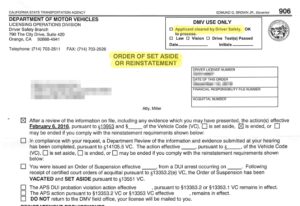
Exhibit 7: The “Order of Set Aside or Reinstatement”, reinstating the client’s driving privileges, winning the DMV hearing. (Click on an image to make any image on this page larger and more readable).
The DMV decision was in our client’s favor, and the client’s driving privileges were reinstated in full in California.
And, in this case, our client was very happy that they hired our services.
Contact our DUI defense firm if you need our experience.
This is only one of a long list of DUI dismissals we have obtained in Orange County. We are happy to apply our education, training, and experience in handling Orange County DUI cases over 23 years to win cases.
Contact our firm if you are interested in discussing with us what is possible in your case, interesting in winning your case at the DMV or in court.


